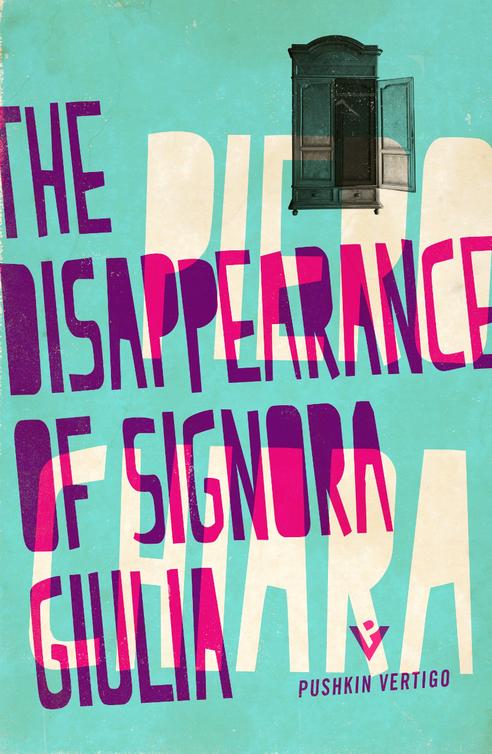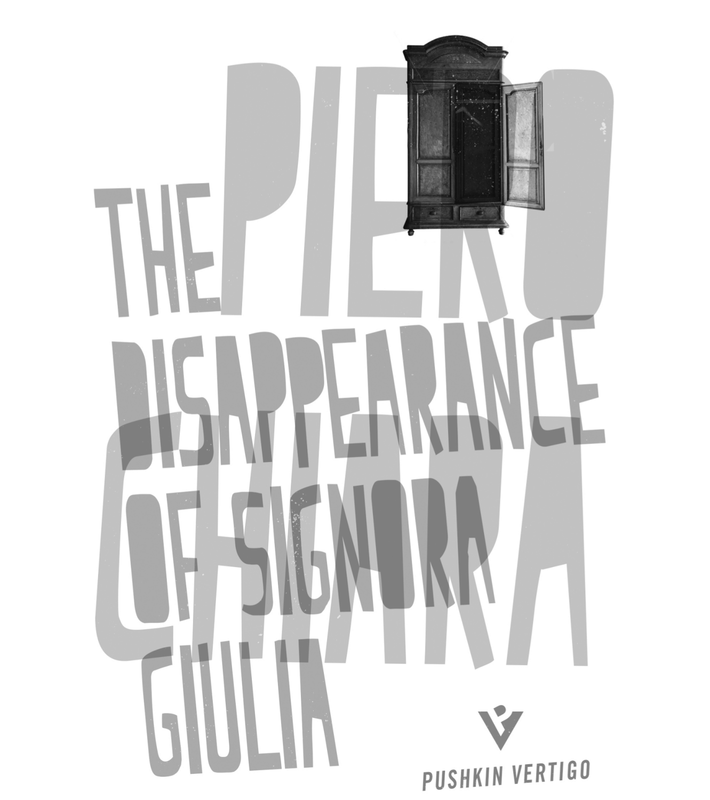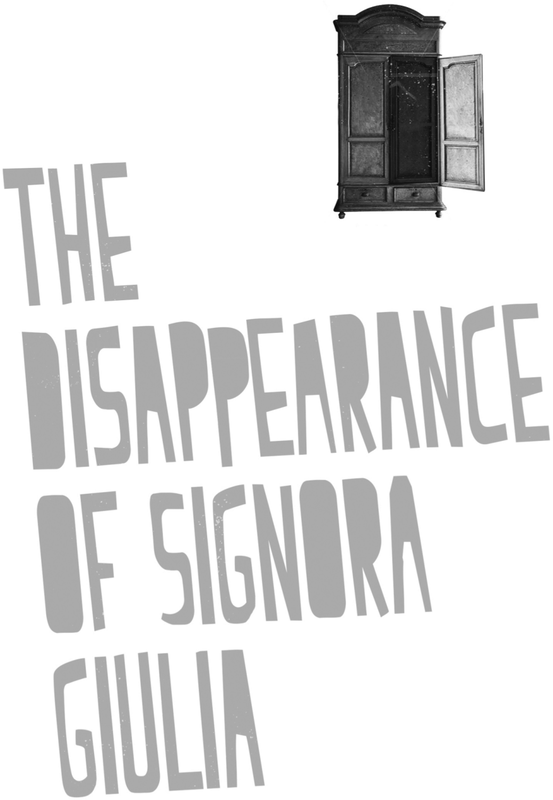The Disappearance of Signora Giulia
Read The Disappearance of Signora Giulia Online
Authors: Piero Chiara


Whose dark or troubled mind will you step into next? Detective or assassin, victim or accomplice? Can you tell reality from delusion, truth from deception, when you’re spinning in the whirl of a thriller or trapped in the grip of an unsolvable mystery? You can’t trust your senses and you can’t trust anyone: you’re in the hands of the undisputed masters of crime fiction.
Writers of some of the greatest thrillers and mysteries on earth, who inspired those who followed. Writers whose talents range far and wide—a mathematics genius, a cultural icon, a master of enigma, a legendary dream team. Their books are found on shelves in houses throughout their home countries—from Asia to Europe, and everywhere in between. Timeless books that have been devoured, adored and handed down through the decades. Iconic books that have inspired films, and demand to be read and read again.
So step inside a dizzying world of criminal masterminds with
Pushkin Vertigo.
The only trouble you might have is leaving them behind.


Corrado Sciancalepre arrived at his office around midday. He’d been in the magistrates’ court acting as a witness in a trial for theft that had taken up much of his time during the past year and was now slowly winding down. The evidence had been weak from the start, but the culprits had finally been identified and the stolen goods recovered.
He was blessed with a special form of intuition, that peculiar mental agility that enables great policemen to delve into the minds of criminals. His successes had mounted up, and a well-deserved promotion was in sight. And yet he would have hated to leave the small town of M—— in northern Lombardy. For ten years he’d been commissioner for public safety, and his two children had been born there. By now he was completely at home in the area and had even mastered the dialect. Locals treated him with reverential respect, almost a prerequisite for his success, and he was particularly well loved by petty criminals. He instinctively knew how to treat them, so that they almost enjoyed being caught by him. In Neapolitan dialect – more familiar to him than his native dialect from Palermo, since he’d lived in Naples at the start of his career – he’d say, ‘What’s the big deal? I like criminals well enough!’ He was born for the criminal as the hunter for his prey.
Outside of his work as an investigator, Sciancalepre busied himself reconciling married couples and putting their kids back
on the straight and narrow – a worthy if unglamorous sideline. You could almost have called him an institution. There was no party or meeting – at the home of the mayor, the chief of the carabinieri, the head of finance or the town’s movers and shakers – to which he wasn’t invited with his wife, a plump and jolly woman from Bologna.
That morning in court, a little gang of thieves had been defended by the lawyer Esengrini, known within the region and beyond as the most agile and authoritative criminal lawyer around. He’d been honorary vice magistrate for around twenty years, was a former mayor, and during the fascist period had been respected and feared as chief magistrate.
Esengrini had spoken little during the hearing. He’d let the reading of the charge and the cross-examination continue without interrupting to question the witnesses, and without a single objection to the public prosecutor or plaintiff. He only asked the victims to clarify a couple of things, because during the summing up it was easy for him to play down the facts and obtain trifling punishments, with the full benefit of the law.
Though lacking the eloquence of a southerner, Esengrini was nevertheless a superb lawyer, worthy of the court of assizes, where in fact he had appeared many times in trials of great importance. He stayed in the area because he loved its peacefulness, but also out of a sort of gentlemanly laziness, one of his most striking characteristics. Sciancalepre admired him unconditionally, and whenever Esengrini read and analysed one of his reports he knew that none of its subtleties would go unnoticed.
Esengrini’s personal prestige was acknowledged by the police, the judges and his colleagues, right down to the man
in the street. His figure, tall and robust, contributed to this, as did his pallid, severe face, with an old-fashioned moustache and deep-set eyes. But above all, he had complete confidence in applying the most accurate and indisputable legal form to every criminal offence. His authority only stopped with his wife. Twenty years younger, she treated him like an old uncle. His daughter, only just fifteen, thought of him more as a grandfather than a father.
The moment he entered his office upon his return from court, Sciancalepre found a phone message directing him to the provincial capital to confer with the chief constable. He phoned his wife, complaining bitterly about having to miss his daily spaghetti, and set off. When he returned to the police station in the early afternoon he found Esengrini waiting for him; he’d been there for the last half hour.
Sciancalepre was dumbfounded. It was the first time the lawyer had set foot in his office. He immediately sat down at his desk, knowing that it must be something important – something personal – and prepared to listen respectfully.
Esengrini glanced at the door to make sure it was shut. Then, suddenly bewildered – a look Sciancalepre would never have expected on such a noble face – he leant over the desk before beginning.
‘Sciancalepre, I’m faced with an incredibly serious matter. It’s most upsetting – it’s going to turn my entire life upside-down.’
Big words, thought the Commissario. This was new, and unusual coming from a cold fish like Esengrini, someone so reluctant to indulge in confidences.
A short pause, and the lawyer went on, his voice even softer, his face lowered right over the table. ‘My wife, Commissario!
My wife has run away from home.’ He straightened up, sighing deeply, and looked at Sciancalepre, as if asking him to account for this flight.
‘Your wife? But how is that possible? Signora Giulia! Why would she run off, with a husband like you, a daughter, and a house like yours? What the devil are you telling me, Esengrini? I’m very sorry, but I’m afraid I just can’t believe it.’
‘She’s fled. Disappeared,’ the lawyer repeated, trailing off tragically. ‘Come and see for yourself!’
The Commissario followed him. Along the village road lined with grand old houses, they came to an enormous door that bore the name ‘Esengrini’ on an enamelled nameplate set up high. The lawyer opened a small door set into the larger one, lowered his head and entered, followed by the Commissario.
They went directly to Signora Giulia’s bedroom, which was next to her husband’s. It was a complete mess, but not the kind of mess thieves usually leave. It was less hurried, and confined to two drawers; the bed, strewn with clean linens; a wardrobe, left open; and a large, half-empty suitcase – tossed aside, perhaps, for a smaller one.
‘As soon as I got back from the trial this morning,’ Esengrini began, ‘I went to my office to give the typist a few things to do. Then, since it was midday, I came straight home, because today’s Thursday. As you know, it’s the day my wife takes the two o’clock train to Milan to visit our daughter who’s in boarding-school at the Ursuline Convent. For about a year now we’ve been eating early at home on Thursdays, since my
wife has to get to the train on time. This weekly journey to Milan dates back to the time our Emilia went away to school, the same one my wife attended as a girl. I’ve never been that happy about it, but I didn’t dare put my foot down. My wife leaves at two and comes back at 7.30. She visits our daughter, sees her dressmaker, her milliner and, if there’s time, does some window shopping on via Montenapoleone.
‘This morning, as soon as I went off to court, my wife packed her bags, two of them: a large one and a small one. She didn’t go out by the door that opens onto the road, since Demetrio, the gardener who sort of looks after things for me when I’m away from my office, would have seen her going by. She couldn’t have gone off on foot with those suitcases – she’d have had to call for a taxi to carry them. Demetrio’s usually in the entrance hall, and would have noticed her through the glass door.
‘So it’s my opinion that my wife went into the courtyard with the suitcases and then down the stairs that lead to the grounds, where someone was waiting for her. She crossed the gardens, went out by the gate leading into the countryside and got into a car. She didn’t leave on the two o’clock train – I’ve already checked. She clearly planned this escape, because I heard her from my room last night, moving around continually, opening drawers, shifting chairs. She was agitated. And I noticed it this morning, too, before going to the office.
‘But for some months, Thursday’s been an odd day. My wife has to leave, to remember all the things her friends have asked her to do in Milan, put together a packet of sweets for the nuns, keep in mind the things our daughter has asked for, and who knows what else.’
The Commissario looked around, shaking his head. When the lawyer had finished, he asked him point blank, ‘What else do you want to tell me?’
Esengrini led him into the sitting-room, settled him in an armchair and in an altered tone of voice – lower, almost ashamed – added, ‘Sciancalepre, you’re a southerner and can understand certain things better than I can. I can’t say that I’m not up to it, but I’m definitely getting there. In recent years, our twenty-year age difference has really created a gap between my wife and me. Did you notice that even though our rooms are next to each other, they’re separate? It’s been like that for more than a year. Signora Giulia wants nothing more to do with me in bed. She says that for me, bed is a branch of the office: I read trial proceedings, take notes and look through legal journals until late. I’m sixty, you know, and I’m like any other sixty-year-old man. But my wife is only thirty-eight, to be exact…’
‘So?’ asked Sciancalepre.
‘So one Thursday four months ago, I had her followed to Milan, and something turned up for me – though to be honest, not much. Sergeant Arcidiacono, you know the one who was employed here and who’s been at police headquarters in Milan for six months? He did the job for me. He followed my wife and reported to me for two Thursdays in a row. As soon as she arrived in Milan she’d hurry through the visit to our daughter near the Ursuline in half an hour, then go to sit in the tea room at the back of a little pastry shop on the corso Monforte where – guess who was waiting for her? That engineer, Fumagalli, the young guy who was around for a while last year while he was
working on enlarging the harbour. He became part of our circle, remember? You too had him at your house. He was our wives’ little pet. Yours invited him to have tortellini with you. The magistrate’s wife wanted him to marry their daughter, and Commendatore Binacchi’s daughter, the older one, seemed to have reeled him in with her dowry of half a million.’
‘I remember, I remember,’ said Sciancalepre, nodding slowly, his eyes closed. He zoomed through his memory, his policeman’s intuition bent on finding some sign of the young man.
‘It was definitely Fumagalli. They were chatting and drinking tea. Once, he took her hand gently.’
‘And then?’ asked Sciancalepre.
‘Then: nothing. When she was trailed the second Thursday, they left one another after tea and she took a taxi. Arcidiacono hopped into another one and followed her. My wife’s taxi stopped in viale Premuda. The sergeant stopped there too, but just at that moment there was an attempted robbery in a little jeweller’s, and he had to intervene. So he lost my wife.
‘That’s it. I didn’t want to go on looking into it. I decided to wait until the end of my daughter’s school year to take away my wife’s excuse for the weekly visits to Milan. And I determined to take her on a long cruise in the summer in order to work on winning her back – all unlucky husbands have the same false hope.’
‘Esengrini,’ Sciancalepre began, ‘I’ll start looking for her immediately. But I’ll need you to bring an action against her.’
‘Ah, yes, that. Let’s see, what should I charge her with? Abandoning the marital home, don’t you think? It’s the only possibility in this case. I’ll send it to you before this evening.’
‘Tomorrow I’ll go to Milan to look for Fumagalli,’ said the Commissario. ‘Let’s see what he has to say.’
They stood up. Sciancalepre wanted to be taken round the park, up to the gate and along the path Signora Giulia would have used in the first part of her escape. He already knew where the house and gardens were, but he saw them now in a new light. He made a note of the way the façade of the old villa Zaccagni-Lamberti, where the Esengrinis lived, aligned with the other buildings on the via Lamberti. The front door opened onto the street, and a bit further along was the door to the lawyer’s office. Set into the façade were two barred windows, one corresponding to the study and the other to the entrance hall. From the entrance a short corridor led to a larger
hallway
, off which opened three rooms that had been turned into archives, each with windows onto the internal courtyard. At the end of that hallway, a solid door led to Esengrini’s quarters, arranged over two levels of a wing that stretched about twenty metres into the grounds; looking out over the gardens was a spacious balcony. Opposite this was another parallel wing, in line with the house on via Lamberti. Signora Giulia’s parents had lived in that part of the house until ten years ago. At their death, the apartment had been shut up and was now awaiting renovation – perhaps when Signora Giulia’s only daughter got married.
Between the two wings was a courtyard with a fountain at its centre. A balustrade marked the boundary between the house and the grounds, and from the balustrade a double staircase descended to the park below. The gardens stretched about two hundred metres from the house towards a tall gate that let onto a country road. The grounds were surrounded on all
sides by high walls that bordered the grounds of the nearby Ravizza and Sormani houses.
On his way out of the house the Commissario went through the office and asked the gardener, Demetrio, to come along with him. At the station, he questioned him briefly. Demetrio verified that on the morning in question, Signora Giulia had not left through the study or through the front door in via Lamberti. Sciancalepre knew that Demetrio’s wife had gone as usual to the house that morning to help with the chores, and that she’d been sent home almost immediately on the pretext that since Signora Giulia had already made the beds, she could return later to do the cleaning.
One could therefore place Signora Giulia’s departure at some time after eleven, and through the gate at the edge of the grounds. The key to that gate was normally kept on the ground floor of an old coach house standing against the park wall. Esengrini had already confirmed that the key had been left in the keyhole on the inside, and the gate left ajar.
Since it had been dry for several weeks, Sciancalepre thought it pointless to attempt to take impressions of tyre marks from the country road running alongside the gate – all the more so since at least ten cars passed along that road every day on their way to the lake.